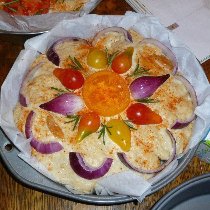Hello and welcome!
I’m Iggy Bauer, a current AmeriCorps Service Member with FSPA. I’m one of those people that likes to cook my own meals and try new things, and I avoid fast food. Even when I buy pre-made food (like macaroni and cheese or cereal), I like to dress it up when I can. When people ask me why, my usual response is, “Life’s too short to eat cr**py food.” And it is! There’s a whole world of flavors out there that we don’t always think about eating. For instance, next time you make a box of macaroni and cheese, why not add some caramelized onion and extra shredded cheese?
But even more than wanting to fill my life with good food, I want to learn and show people how to eat sustainably. This recipe-sharing page comes from a mixture of that goal and the Laudato Si’ goals that I’ve been immersing myself in for most of the last year. Laudato Si’ asks us to care for the Cry of the Earth and the Cry of the Poor, to adopt simple lifestyles, and to embrace ecological economics, all of which can be helped by being mindful of what we eat and how that affects the world around us. To me, eating sustainably is an adventure in trying new recipes and new foods, and looking at different ways to set up a meal.
Eating Seasonally
Part of the goal of this webpage is to show how to eat more sustainably by eating seasonally and locally. Food that comes from the garden in town (and the FSPA garden), or the small family farm just a few miles away, is almost always going to have a lower carbon footprint, not to mention a higher impact on the local economy and the livelihoods of our neighbors. This helps us eat seasonally, too, since the gardeners and farmers will provide what they have at the moment: cucumbers and tomatoes in the summer, squash and potatoes in the fall, meats and preserved goods in the winter, asparagus and lettuce in the spring, and everything in between.
Exploring our Heritages
But there’s another aspect to eating sustainably, and that’s remembering the people and cultural part of eating. These are things we’ve almost lost in the decades of tv dinners and boxed food. We’ve largely forgotten how to cook the way our grandmothers and their mothers did, making everything from scratch and passing recipes down through generations. While we share recipes that we remember from our childhoods (or perhaps recipes that we’ve perfected and plan to pass down in our own families), we can also discover rich recipes from cultures that may not be our own.
Embracing Indigenous and Ethnic Foods
Indigenous and ethnic groups have ways of preparing food that are incredibly flavorful and different from what we’d expect, and these foods are generally better for the land it comes from. And when we share recipes between cultures, we help grow and preserve those cultures. I encourage you to watch this TED Talk by Winona LaDuke, an Ojibwe woman from White Earth reservation in northern Minnesota. She talks about how important it is to be mindful of what you’re eating by showing how her people view food as their relatives, as well as discussing some problems with our larger food systems as they currently are.
Submitting Recipes and Subscribing to our Page
I’d go into these problems more, but I’ve already talked too long. You’re here for recipes, right? Through the end of my AmeriCorps service term with FSPA, I’ll be uploading the recipes we’ve all shared one at a time throughout the week. Unfortunately, I’ll be leaving in mid-August (which is coming up faster than expected). After I’m done, Affiliate Vicki Lopez-Kaley will be taking over for me. Recipes will still be shared, but more likely only once a week.
Remember, you can always subscribe at the bottom of this page or any recipe page so that new recipes go straight to your email inbox! The best way to get recipes to us is by emailing them to ecopact@fspa.org, or by submitting physical copies to the St. Rose front desk (look for the Recipe Swap Box). We’ll keep on accepting new recipes, so please keep sending them! Happy cooking!





Post a Comment